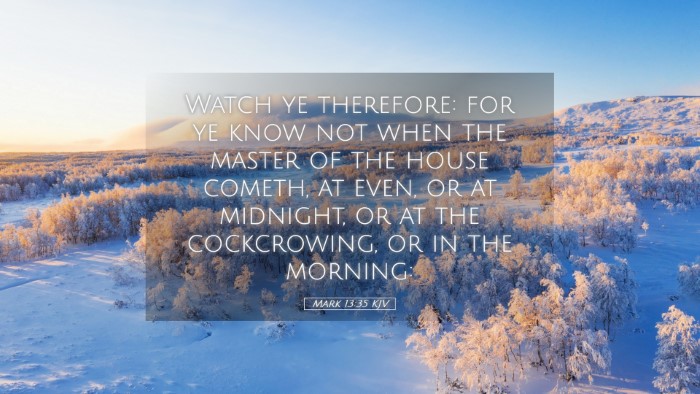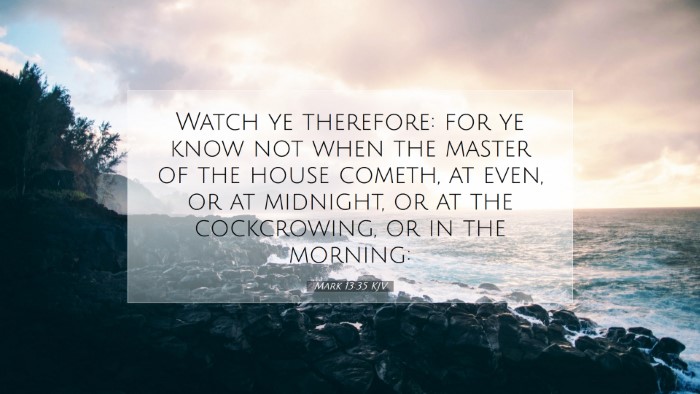Commentary on Mark 13:35
Verse: "Watch therefore: for ye know not when the master of the house cometh, at even, or at midnight, or at the cockcrowing, or in the morning:" (Mark 13:35, KJV)
Introduction
This verse, part of the Olivet Discourse, calls for vigilance and preparedness in the lives of believers. Jesus, speaking to His disciples about the end times, presents a parable that emphasizes the need for constant readiness. The coming of the Lord is uncertain in timing, and this uncertainty requires a posture of alertness from His followers.
Historical Context
In the context of Mark 13, Jesus has been prophesying the destruction of Jerusalem and the signs of the second coming. The discourse serves as both a warning and an encouragement to remain steadfast in faith despite the trials to come. The imagery of a master returning home draws on the domestic life familiar to the audience, illustrating the importance of being prepared for an unexpected arrival.
Exegesis of the Verse
“Watch therefore”
Jesus begins with an imperative. The word "watch" implies a diligent awareness, urging disciples not only to be aware of the signs but to also cultivate an attitude of spiritual readiness. This call to vigilance resonates with various passages throughout Scripture, where believers are instructed to remain alert (e.g., 1 Thessalonians 5:6).
“For ye know not when the master of the house cometh”
The uncertainty of the master’s coming highlights the unpredictable nature of Christ’s return. Thoughtful commentaries, such as those by Albert Barnes, emphasize that this strikes at human complacency, urging believers to examine their spiritual state continually. The lack of knowledge regarding the exact timing serves as a reminder that God’s timing often runs contrary to human expectation.
“At even, or at midnight, or at the cockcrowing, or in the morning”
This list of times represents every conceivable moment in a daily cycle, illustrating the constant need for vigilance. Matthew Henry notes that the various times of day signify the unpredictability of the Lord’s return and the necessity of being prepared at all hours. This analogy reinforces that spiritual alertness must transcend the bounds of routine and expectation.
Theological Implications
This verse sheds light on the doctrine of the parousia (the second coming of Christ). It serves as a poignant reminder that the believer's life is not one of passive waiting but of active engagement in the work of the Lord. Adam Clarke articulates well that this concept aligns with the Biblical worldview that emphasizes accountability and preparation for the inevitable return of Christ. The underlying principle here is that the faithful servant is neither idle nor complacent but is consistently working in faith until that day arrives.
Practical Applications for Believers
- Cultivating Spiritual Vigilance: The essence of this verse should inspire believers to engage in spiritual disciplines—prayer, study of the Word, worship, and fellowship—as a consistent practice, not just a prelude to times of crisis.
- Living with Purpose: The awareness of an imminent return must influence daily living. Believers are called to live lives marked by love, service, and good works, as a witness to the world of the gospel.
- Encouragement for Community: The local church plays a crucial role in helping believers stay accountable. Engaging with a community encourages shared vigilance and collective preparedness.
- Combatting Complacency: Daily reminders of the Lord’s return can fight against the lethargy that can easily ensue in Christian life. This can be achieved through study, fellowship, and teaching.
Conclusion
Mark 13:35 encapsulates the call to vigilance for believers living in a world ripe with uncertainty. The teachings derived from this verse and its surrounding context guide a faithful response to the promise of the Lord’s return. By embracing the posture of watchfulness, rooted in an active faith, Christians can confidently await their Master’s return, living as stewards of the grace they have been given.


